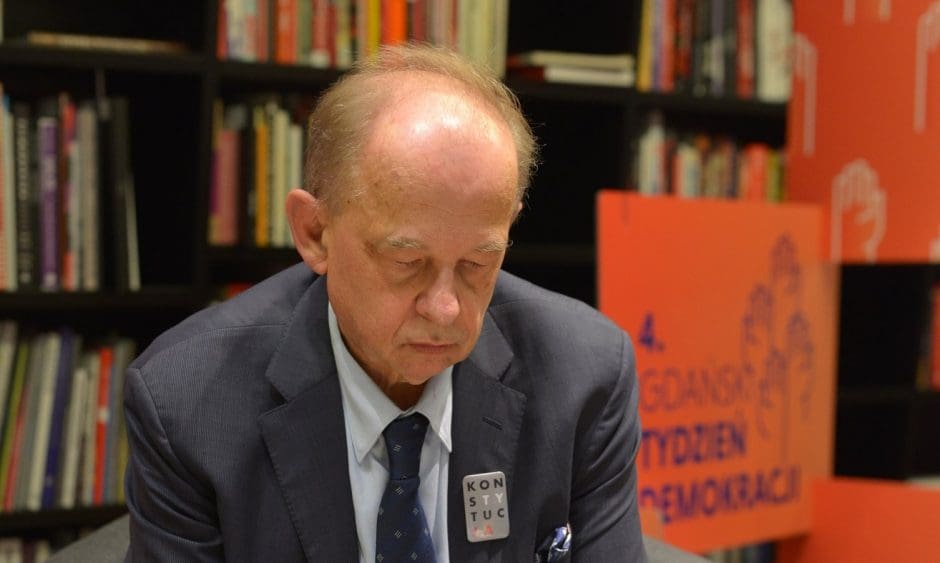Professor Wojciech Sadurski, the Challis Chair of Jurisprudence at Sydney University, is facing politically-motivated civil and criminal defamation charges in Poland amid attacks by its right-wing government on the judiciary, press and freedom of speech.
Professor Sadurski is an expert in constitutional law and is the author of, among other works, Poland’s Constitutional Breakdown and, perhaps ironically, Freedom of Speech and its Limits. He has been critical of the ruling Law and Justice Party’s (PiS) undermining of the Polish constitution, and is active in the Polish media and international academic circles. Professor Sadurski told Honi that the charges are “purely political accusations” which are “incompatible with a democratic state.”
Professor Sadurski faces three charges relating to tweets critical of the Polish government and state television. A civil defamation suit brought against him by the ruling right-wing populist PiS was dismissed in June, but an appeal is expected. In a highly unusual move, Polish state television (TVP) has brought both civil and criminal defamation actions against Professor Sadurski in respect of a tweet in which he described TVP as a “Goebbelsian media organisation.” If convicted of the criminal charge, Professor Sadurski faces up to 12 months imprisonment.
In January 2016, the Polish Parliament legislated to take control of TVP and fired all 118 of its senior management staff, replacing them with direct political appointees. Many journalists critical of the government have since been removed from their positions at public broadcasters or subject to legal harassment by PiS. After the Mayor of Gdansk, a critic of PiS and regular subject of TVP invective, was assassinated in 2017, his widow linked TVP’s campaign against her husband to his assassination. TVP then sued for defamation a number of prominent Poles who repeated the allegations. In 2020, Poland fell to its lowest ever ranking of 62nd in the Press Freedom Index. In 2015, the year in which the Law and Justice Party was elected, it ranked 18th. Professor Sadurski told Honi that “the fact that the media is suing its opponents for defamation is either ironic or perverted.” TVP was contacted by Honi for comment, but failed to reply before publication
Professor Sadurski expressed concern to Honi about his prospects of receiving a fair trial in Poland against a background of attacks on the independence of the judiciary. Since its election in 2015, the PiS government has sought to exert control over appointments and opinions of the judiciary. A 2015 law attempted to lower the retirement age for judges from 70 to 65, while granting complete ministerial discretion to extend terms beyond that limit. This was widely seen as an attempt to remove judges perceived to be critical of the government, while allowing for favoured members of the judiciary to remain. These laws were struck out by the European Court of Justice in regards to the Supreme Court, but are still applicable in lower courts, such as those hearing the suits against Professor Sadurski.
In December 2019, legislation was passed to establish a new Disciplinary Chamber of the Supreme Court, with powers to fine or sack judges that engage in “political activity” or question the independence of the politically appointed Chamber. Furthermore, the National Council of the Judiciary, which oversees the appointment of judges, has been overhauled to allow for political appointments to the Council, effectively granting the government control over judicial appointments. These sustained attacks on the rule of law prompted the EU, for the first time in its history, to invoke Article 7 proceedings against a member state for persistent breaches of “EU values,” which can result in the suspension of that country’s EU voting rights. The proceedings are ongoing. Despite this, Professor Sadurski draws some comfort from the “many judges who are courageous and honest” that still remain in Poland and has been encouraged by the favourable preliminary verdict in the PiS case.
While noting the significant cost and time pressures associated with having to defend himself from state-sponsored legal harassment, Professor Sadurski remains defiant and views his defence as an opportunity “to practice what I preach” about democracy and freedom of speech. Sadurski has received widespread backing from the academic community, with an open letter in his support co-signed by 70 prominent legal scholars from around the world. In a statement to Honi, Professor Simon Bronitt, the Dean of Sydney Law School, decried the “extraordinary proceedings, inimical to the values of free speech” and said that “Sydney Law School, and the university as a whole, stand in solidarity” with Professor Sadurski.
On June 18, a judge made an interim decision dismissing the defamation action brought by PiS. An appeal is expected. The trial for the suits brought by TVP will commence on October 2.





